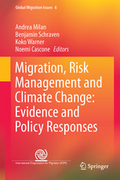Remittances for adaptation: an "alternative source" of international climate finance?
Bendandi, Barbara / Pieter PauwExterne Publikationen (2016)
in: Andrea Milan / Benjamin Schraven / Koko Warner / Noemi Cascone (eds.), Migration, risk management and climate change: evidence and policy responses (Global Migration Issues), Berlin, Heidelberg: Springer, 195-211
ISBN: 978-3-319-42920-5
Information
Climate finance is becoming increasingly important in climate negotiations. According to the UNFCCC’s Copenhagen Accord, climate finance ‘will come from a wide variety of sources, public and private, bilateral and multilateral, including alternative sources of finance’. In this chapter, we analyse whether remittances could constitute an ‘alternative source’ of adaptation finance, for three reasons. First, there is a huge and unexplored potential: recorded remittances to developing countries are expected to increase to USD 516 billion in 2016. Second, other than public adaptation finance, remittances directly reach to households, including, in some cases, those in remote and vulnerable areas. Third, remittances are often employed for climate-induced disaster relief and sometimes also for investments in long-term adaptation strategies.
Whilst not ignoring ethical arguments that oppose remittances of poor migrants as an alternative source for adaptation finance for developing countries, this chapter examines empirical evidence from literature on remittances against ten climate finance criteria as negotiated under the UNFCCC Copenhagen Accord to understand whether remittances could constitute international adaptation finance. Our analysis finds that incentives need to be provided in order to channel remittances towards adaptation. Remittances could match criteria such as ‘adequate’ and ‘predictability’. However, criteria such as ‘improved access’ can only be matched if developed and developing countries create the right incentives to reach out to the potential diaspora investors. A criterion such as ‘transparent’ is unlikely to be met by remittances. Whether remittances contribute to the USD 100 billion climate finance pledge is, in the end, a controversial political decision, but in any case remittances can help to support adaptation at household and community level. Public climate finance could increase the potential of remittance for such purposes.

